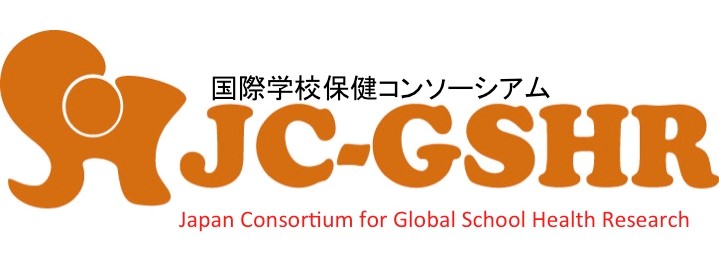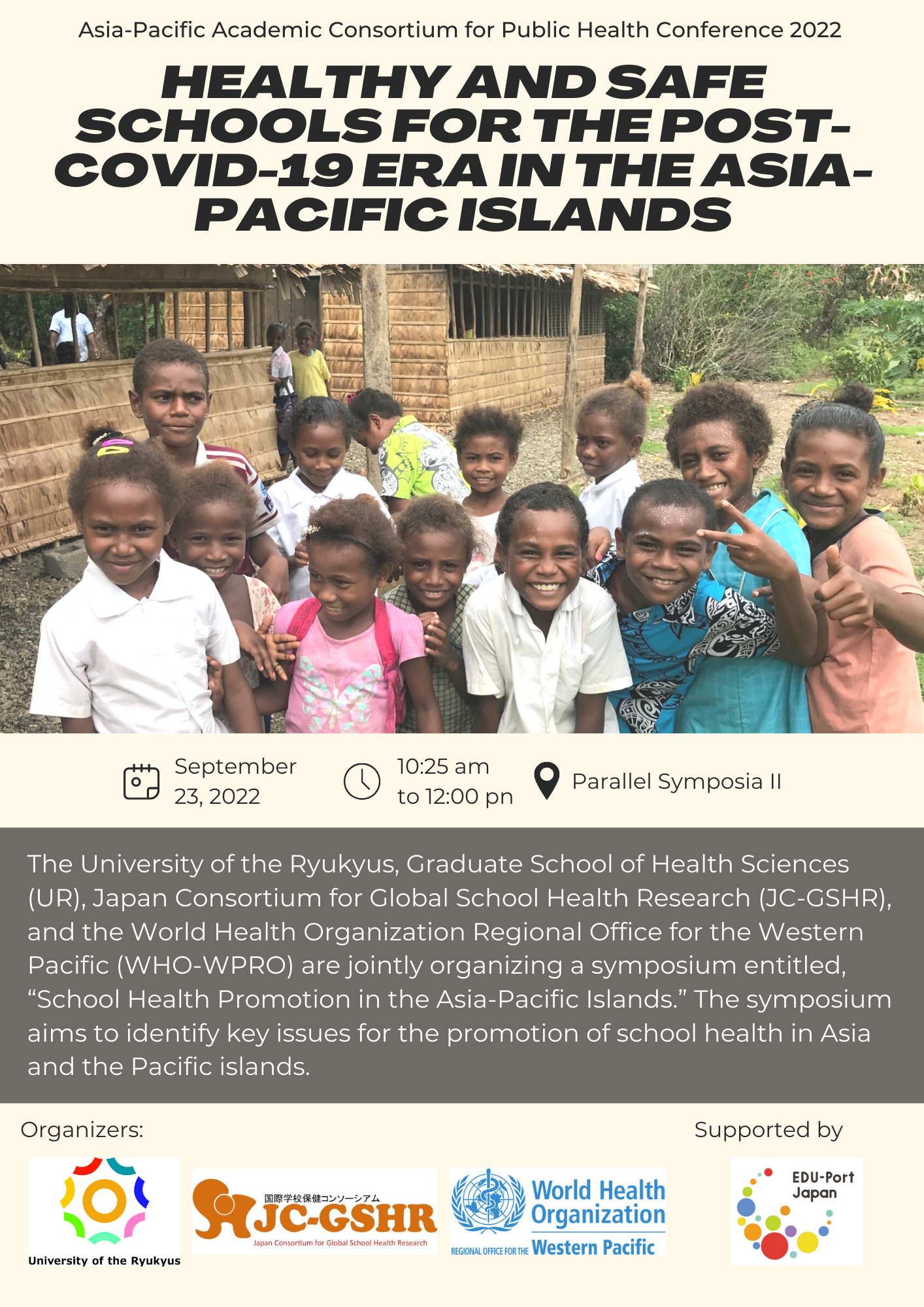Contents
- 1 Study on Healthy and Safe Schools for the Post-COVID-19 Era in the Asia-Pacific Islands
- 1.1 Purpose
- 1.2 About
- 1.3 Meeting
- 1.4 Healthy and Safe Schools for the Post-COVID-19 Era in the Asia-Pacific Islands
- 1.5 Study on Healthy and Safe Schools for the Post-COVID-19 Era in the Asia-Pacific Islands will be held at 53rd APACPH
- 1.6 Research Results
- 1.6.1 (1) Perspectives of sustainable global school health promotion in Asia and Africa.
- 1.6.2 (2) Urgent need to strengthen school health in Asia and the Pacific islands.
- 1.6.3 (3) Recommendations for the urgent need to vaccinate school-aged and adolescent children against COVID-19 in the Asia-Pacific region.
Study on Healthy and Safe Schools for the Post-COVID-19 Era in the Asia-Pacific Islands
Purpose
We will make recommendations for the convergence of the new coronary disease in the countries of the Asia-Pacific region and for the creation of healthy and safe schools after the convergence.
About
We will summarize our findings in Okinawa, Guam, the Philippines, and Indonesia on the impact of the new coronary infection and countermeasures in the fields of health, education, and economy, and make recommendations for the development of a post-coronary healthy society and schools in the island areas through discussions with experts from Pacific island countries (Federated States of Micronesia, Marshall Islands, Palau, Fiji, Papua New Guinea, etc.) based on these findings. We will make proposals for the creation of a healthy society and schools in the post-Corona era. In particular, we will focus on the implementation of comprehensive school health care, including health management and education, as well as cooperation with organizations outside the school and the community as a Japanese-style school health care system. We will also analyze the use of ICT during school closures and the resulting challenges and mental health situations and responses.
Meeting
Due to the global epidemic of new coronary infections, it has been difficult for us to go to the field, but we are holding regular meetings and conducting research with our international research partners, the Faculty of Medicine at the University of Mataram in Indonesia, the School of Public Health at the University of the Philippines Manila, and the School of Health Sciences at the University of Guam, as well as our domestic partners Shinshu University, Osaka University, and Teikyo University.
First Research Partners Meeting October 8, 2021
Confirmation of the purpose of the research and research methods
Second Research Partners Meeting October 29, 2021
Progress report on curriculum analysis and policy analysis in each country
Third Research Partners Meeting November 19, 2021
Report on the progress of the research on the analysis of policies and guidelines for school health in each country
Consensus building on the content of the questionnaire to check the status of policies
4th Research Partners Meeting December 3, 2021
Summary report on the results of curriculum analysis in each country
5th Research Partners Meeting, December 20, 2021
Report on the results of Japan's policy analysis
Preparation of proposals for the international workshop
6th Research Partners Meeting January 10, 2022 (tentative)
Summary report on the results of policy analysis in each country
Preparation for the international workshop
Healthy and Safe Schools for the Post-COVID-19 Era in the Asia-Pacific Islands
Date: January 26 (Wednesday), 2022
Participating Countries
Indonesia, Philippines, Guam, Federated States of Micronesia, Marshall Islands, Palau, Fiji, Papua New Guinea, etc.
For more information, please see this article.
The report can also be found here.
Study on Healthy and Safe Schools for the Post-COVID-19 Era in the Asia-Pacific Islands will be held at 53rd APACPH
The WHO Western Pacific Regional Office, the Japan Consortium for Global School Health Research (JC-GSHR), and the University of the Ryukyus will co-host a symposium to share the findings of the EDU-Port project. The symposium will be held under the theme “Study on Healthy and Safe Schools for the Post- COVID-19 Era in the Asia-Pacific Islands.”
For more information, click here.
Research Results
(1) Perspectives of sustainable global school health promotion in Asia and Africa.
Kobayashi J, Takahashi K.
Pediatr Int. 2021 Sep;63(9):1009-1010. doi: 10.1111/ped.14867.
https://onlinelibrary.wiley.com/doi/10.1111/ped.14867
Summary
The special issue series, “School health promotion in Japan and its contribution to Asia and Africa” provided various les-sons. We also learned about Japan’s historical school health footprint, which still has implications regarding field activities in the area of school health. In this editorial, we consider two articles and attempt to extract lessons for low- and middle-in-come countries in Asia, Africa, and beyond.
(2) Urgent need to strengthen school health in Asia and the Pacific islands.
Kobayashi J, Takeuchi R, Toyama Y, Gregorio ER Jr, Kadriyan H, Estrada CAM, Motomura M, Wake N, Yamada K, Ishikawa R, Takakura M.
Pediatr Int. 2021 Jul 14. doi: 10.1111/ped.14921. Online ahead of print.
https://onlinelibrary.wiley.com/doi/10.1111/ped.14921
Summary
In Asia and the Pacific island region, strengthening of school health activities and measures is urgently recommended to deal with the impact of the increasing risk of potential school closures due to continuation of the coronavirus disease 2019 (COVID-19) pandemic in 2021. As the incidence of COVID-19 in 2020 was relatively low in these regions, many of the countries were able to avoid prolonged school closures. However, even if vaccination is expanded in the future and the pandemic tends to come to an end, the risk of SARS-CoV-2 variants spreading among children will also increase, and the possibility of having to close schools again will also increase.
(3) Recommendations for the urgent need to vaccinate school-aged and adolescent children against COVID-19 in the Asia-Pacific region.
Kobayashi J, Takeuchi R, Shibuya F, Murata Y, Takahashi K.
Trop Med Health. 2021 Sep 16;49(1):74. doi: 10.1186/s41182-021-00365-5.
https://www.ncbi.nlm.nih.gov/pmc/articles/PMC8443906/
Summary
We recommend urgent expansion of a vaccination program for adolescents and school-age children against SARS-CoV-2 infection in the Western Pacific region. Since July 2021, SARS-CoV-2 infections in children have increased rapidly in this region. As infection rates rise due to the SARS-CoV-2 B.1.617.2 (Delta) variant, current preventive strategies such as mask wearing and social distancing have controlled its spread effectively. Prolonged school closure is currently being promoted to suppress virus spread among children. However, the negative impact of prolonged school closure is significant. Although vaccination of children under 12 is still controversial, preparations must be made now for their vaccination.


